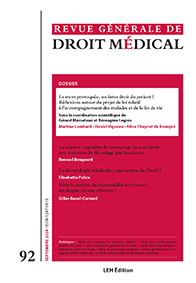Résumé
L’avis n° 139 du CCNE a marqué en 2022 un tournant majeur dans la réflexion sur les questions éthiques relatives à la fin de vie, et ce, en relevant que certains « ne rencontrent pas de solution à leur détresse dans le champ des dispositions législatives ». L’Académie nationale de médecine a rejoint en juin 2023 le voeu d’un aménagement du dispositif actuel « en acceptant à titre exceptionnel l’assistance au suicide ». Ces évolutions prolongeront le « droit » de toute personne à « avoir une fin de vie digne » consacré par la loi, qui prescrit que toute souffrance doit être, en toutes circonstances, prise en compte et traitée. Dans ce contexte, la disparition, du fait de la dissolution de l’Assemblée nationale, d’un projet de loi faisant suite à la Convention citoyenne sur la fin de vie ne fait que reporter la loi qui sera nécessaire pour permettre tant le développement des soins palliatifs qu’une dépénalisation conditionnée de l’aide à mourir.
Mots-clés
Fin de vie – Dignité – Souffrances – Soins palliatifs – Aide à mourir
Abstract
In 2022, opinion no. 139 of the CCNE marked a major turning point in reflection on ethical issues relating to the end of life, noting that some people “do not find a solution to their distress within the scope of legislative provisions”. In June 2023, the French National Academy of Medicine endorsed the idea of modifying the current system “by exceptionally accepting assisted suicide”. These developments will extend the “right” of every person to “a dignified end of life” enshrined in law, which prescribes
that all suffering must, in all circumstances, be taken into account and treated. In this context, the disappearance, due to the dissolution of the National Assembly, of a bill following on from the Citizens' Convention on the End of Life merely postpones the legislation that will be needed to enable both the development of palliative care and the conditional decriminalization of assisted dying.
Keywords
End-of-life – Dignity – Suffering – Palliative care – Assisted dying



